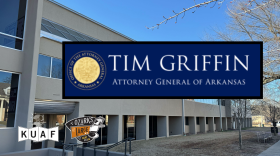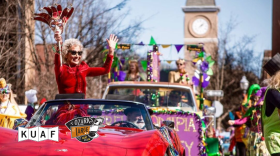Kellams: Every semester, the University of Arkansas Honors College offers its students an opportunity to enroll in a signature seminar led by an expert from the campus. Next spring, there will be courses examining supply chain and society, how art was influenced and influenced the Cold War era, and a seminar titled From Fayetteville to Freedom and Back: Nelson Hackett's Flight from Slavery.
We've discussed Nelson Hackett on this show before. The enslaved man fled Fayetteville in 1841, eventually making it to Canada and seemingly freedom. His enslaver, though, pursued him with a claim that Nelson Hackett stole a watch, and Hackett was extradited. In 1842, he was back in Fayetteville. He was publicly whipped as an example.
Just a few years ago, Nelson Hackett’s story was barely known outside of a small academic circle. There is now a street named in his honor in Fayetteville, and a plaque dedicated to his story on the city square. Next spring's class is designed to share his story and that story's legacy with a broader audience by utilizing tools like digital media.
Michael Pierce, an associate professor of history at the University of Arkansas, will lead the seminar. He says he anticipates not many of the students will know much about Nelson Hackett when the course begins.
Pierce: I actually doubt it. Unless the students grew up in Fayetteville, where the streets have been renamed and where there's been commemorations and signs celebrating Nelson Hackett's life, I don't think Nelson Hackett's story gets much play outside of Washington County or outside of northwest Arkansas. And so, I think as the university is increasingly attracting more and more students from a wider geographic region, the number of students who are familiar with Nelson Hackett's story will be a small percentage.
And so, you know, the class, as I imagine it is, is about a new way of telling Nelson Hackett's story. Most of the details of Nelson Hackett's story are known, but it's a question of how you tell those details and tell that story so that it can reach a wider and wider audience. We're living in an age in which people are not going to pick up an academic book, they're not going to read an academic journal, but they'll go online and they will find stories and find histories online. I have a 16-year-old son who does just that. And we need to make Nelson Hackett's story available to people around the globe. We need to make it available in ways that younger people today and even older people today will find more inviting.
Kellams: The great news here is it's an amazing story. It has all the elements that will suck somebody in.
Pierce: I'll go to academic conferences and I'll talk about Nelson Hackett and I'll talk about his story. And almost immediately, professional historians are saying, well, who's going to play him in the movie? Who's going to play this person in the movie, or that person? And it becomes this sort of parlor game amongst academic historians. And we are a weird lot. I will admit that.
Kellams: So, you have this amazing story. I guess the first class, you'll just tell them who Nelson Hackett was and his journey and his legacy.
Pierce: Well, the class, it's not only me. It's people from CAST on campus who are experts in digital storytelling. They are going to help along, and it's going to be a collaborative effort. We are going to first lay out who Nelson Hackett is and his story and what it means not only to Fayetteville, not only to northwest Arkansas, but what it means to the United States, what it means to the British Empire, what it means to the fight for abolition, which was a worldwide fight.
And so we have to talk about Nelson Hackett's importance. For this first round of the class, what we're going to do is we are going to focus on Nelson Hackett's life in Fayetteville and try to tell that story. The idea is that in subsequent years we can add to that story. We can tell the story of his escape from Fayetteville through Arkansas and Missouri, crossing the Mississippi River into the Free States, making his way to Detroit, and crossing the Detroit River and finding what he thought would be freedom in Canada.
And we can also tell the story about his extradition, about how Alfred Wallace, the Fayetteville merchant who went after him, and why Alfred Wallace spent thousands and thousands of dollars and months away from his other enterprises to retrieve an enslaved man he paid $1,000 for.
I have thoughts on that. I believe that Alfred Wallace and his brother-in-law, a guy named Evans, were involved with the Fayetteville branch of the Arkansas State Bank. Like a lot of people involved in the Fayetteville branch of the Arkansas State Bank, they were playing fast and loose with the bank's money, using it as their own to speculate with the idea that they would make good on it when the books needed to be balanced. My suspicion, and there's no concrete evidence but good circumstantial evidence, is that Nelson Hackett took a big chunk of money, thousands of dollars of paper or coin or whatever, and either hid it or burned it or took it with him.
As soon as Nelson Hackett leaves, Alfred Wallace, his enslaver, and Wallace's brother-in-law Decimus Evans, get into a heap of trouble with the Fayetteville branch of the Arkansas State Bank, and they become desperate. For them, retrieving Hackett becomes their only hope of redeeming themselves.
These are stories that need to be told. One of the fascinating parts of this is that not because of Nelson Hackett, but because of the endemic corruption in the Arkansas State Bank, the Arkansas State Bank never found its footing, and it collapsed. The state of Arkansas passes a law saying no more banks in the state. And what this does is it creates all sorts of problems for Arkansas moving forward. Additionally, it puts the state of Arkansas in tremendous debt. This is the debt that Arkansas throughout the 19th century can't climb out of.
I kind of think of it as Nelson Hackett knew what he was doing. When he left, he was trying to bring down the system that made slavery possible, because in the early 19th century it was the banks that were funding both the speculation and the trafficking of human beings. By helping destroy this bank, Nelson Hackett was waging a battle for freedom not just for him, but for a lot of people.
Kellams: Every time I talk to you about Nelson Hackett, there's another piece of the web that's like, oh my gosh. So in 2025, why is it important to try to get this story not just to those of us who live in northwest Arkansas or Arkansas, but around the world?
Pierce: One of the ways historians have traditionally told the story of the coming of the Civil War—the sectional crisis, if you will—that ended with the emancipation of 4 million enslaved people is to talk about the West, to talk about popular sovereignty, to talk about slavery in the West and to make that the focal point. The story of Nelson Hackett is part of a larger project of historians that says, wait a minute. That focus on the West ignores the role of fugitive slaves in propelling the sectional crisis.
The issues of fugitive slaves, especially in northern communities, were visceral. It was like you know helping enslaved people– slave catchers coming through. It forced folks in the North to confront the question most of them didn't want to know: What is the place of slavery in a nation dedicated to the proposition that all men are created equal?
So, in many ways, what historians are doing is they're putting fugitives at the center of the sectional crisis. Twenty years ago, 30 years ago, with this focus on slavery in the West, Black people were minimized in the story. Understanding things like Nelson Hackett's story really changes the way that we come to understand the defining moment in American history—the Civil War and the emancipation of 4 million people—to make Black folks agents and actors in this story, rather than people who are acted upon.
That is a new way to think about American history. That marginalized people have always played a role in shaping what our nation has become. American history is Not the story of just…
Kellams: Vanderbilts and Rockefellers?
Pierce: Yes. Telling Hackett's story also changes ideas of what Canada offered to fugitives. Through telling Nelson Hackett's story, it becomes increasingly clear that Canada was the Promised Land for fugitives, not because of anything the Canadians did, but because of the imperial government in London. After Hackett's case, he gets sent back to Fayetteville. It is the imperial government in London stepping in, taking control of the extradition process from the Canadians and saying no more fugitives will be returned to slavery. Understanding Hackett's story reshapes Canadian history in fundamental ways and the notion of Canada as the Promised Land.
Kellams: You were talking about Nelson Hackett’s time, the North having to be confronted. I think talking about the stories of Nelson Hackett and other enslaved people in 2025 makes people confront things now, too.
Pierce: Oh, of course. Historians will always tell you that race and class have been the defining struggles of the United States for the past almost 250 years. The story of Nelson Hackett, because slavery is a caste system and it's also racialized, puts those issues of elite control, of marginalization of people for the benefit of the few into perspective.”
Kellams: This sounds like an incredibly exciting experience for you and the students.
Pierce: Yeah. This story and being able to begin to tell it fully to a much wider audience. One of the things I'm really excited about, and I don't think people in Washington County really appreciate this, is the Washington County Archives is a treasure trove. It is possibly the county archives west of the Mississippi with the most historical documents. Lots of places west of the Mississippi, either through the Civil War, through fires, through floods, through natural disasters, have seen their archives, their records destroyed.
For some reason, the pre-Civil War records in Washington County were saved. We have a set of records, whether they're probate records, deed records, land records, or court records, that go back further in Washington County than most other places west of the Mississippi. I just want students to go into those archives and see what they can find, because there are other stories waiting to be told.
It will help us understand the development of northwest Arkansas. It will help us understand the role that forms of unfreedom played in the making of northwest Arkansas. Already, we have an academic project coming out of Nelson Hackett and one of the historians in Fayetteville, a woman named Lisa Childs, is doing some wonderful work connecting Nelson Hackett's story, the growth of Fayetteville and the migration of Cherokees.
What she is finding is absolutely amazing. Her telling is that Fayetteville existed, it grew, it was a boomtown in the 1830s because people flocked here to take advantage of, to exploit, the forced removal of Cherokees from parts of the Southeast. These are the types of stories that can be told using Nelson Hackett as a way to get into these archives to understand the place where we live.
I'm the type of historian that I want to know everything about the development of the place I live. For me and for a lot of historians, there are important stories to tell, not just for our own sake as a community, but to enlighten a broader human experience and to make those small actions far away from nations’ capitals or imperial capitals meaningful to understanding where we are today.
One of the things I want the students to take away from this is that history is not only what happens in the halls of Congress or by governors. History is made every day through the most mundane, seemingly mundane experiences. It's the choices of average human beings that really make a difference in how we have developed as a people.
Kellams: Michael Pierce is an associate professor of history at the University of Arkansas. Next spring, he will lead the Honors College seminar From Fayetteville to Freedom and Back: Nelson Hackett's Flight from Slavery. You can learn more about Nelson Hackett here.
Ozarks at Large transcripts are created on a rush deadline. Copy editors utilize AI tools to review work. KUAF does not publish content created by AI. Please reach out to kuafinfo@uark.edu to report an issue. The audio version is the authoritative record of KUAF programming.








